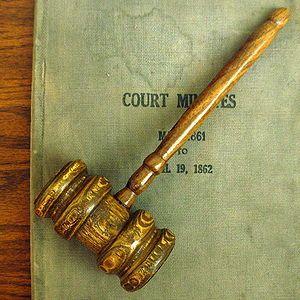Bill Would Neuter Grand Juries
By KATY GRIMES
Grand Juries play a vital role in the California judicial system. They expose and prosecute government corruption, waste and abuses of power by elected officials, boards and commissions.
But that could change if freshman Assemblyman Roger Dickinson, D-Sacramento, gets his way. Dickinson is challenging California’s Grand Jury system, and has proposed a bill that would neuter the very effective Grand Juries.
Assembly Bill 622 would require that sworn Grand Jury testimony be taken in public; that 45 days prior to the proceeding the juries meet with the agency head they are investigating; and that attorneys be allowed in the Grand Jury proceedings with clients.
A Grand Jury acts as an independent investigative unit, with all of the scope and authority to bring public officials to justice. The concept of the Grand Jury was originally created in England to serve as watchdog against abuses by the crown. Adopted in America as a check on general governmental oppression and corruption, the Grand Jury system is historically and firmly planted in the American legal system.
“Secrecy has long been a hallmark of grand juries,” Dr. Marrianne Jameson with the California Association of Grand Jurors. “In modem times, the California Supreme Court summarized the reasons for grand jury secrecy as to encourage free and untrammeled disclosures by persons who have information with respect to the commission of crime, and to protect the innocent accused who is exonerated from disclosure of the fact that he has been under investigation and from the expense of standing trial where there was probably no guilt.”
But Dickinson has history with the Sacramento Grand Jury, which may be at the very heart of the motive for the bill. Some are suggesting that his bill may be a revenge tactic. And many have asked why and how government officials can alter the Grand Jury process, when they are often the subjects of the investigations.
Dickinson’s Library
In 2008, the Sacramento Grand Jury investigated and found gross mismanagement and financial conflicts of interest within the Sacramento Public Library Authority. The Grand Jury skewered the library’s governing board, of which Dickinson was a member as a Sacramento County Supervisor.
The 2007–08 Sacramento County Grand Jury issued a 28-page report accusing the library of fraud and mismanagement on multiple counts. It found that because of a lack of oversight, the library hired a maintenance company that inflated invoices for more than three years and was co-owned by the wife of a library staffer.
Despite the Grand Jury findings of gross mismanagement and even after the library director and two library officials were charged with felonies in the billing scandal, Dickinson stubbornly stood by the library director — even after the Grand Jury recommended that she step down.
The Grand Jury conducted more than 40 interviews, including current and former members of the Library Governing Board, reviewed more than 1,500 library financial documents and committee meeting minutes and issued more than 70 subpoenas.
Most of the Governing Board, members of the Sacramento City Council and the County Board of Supervisors, were old hands at public service, and had served on the Board for at least 11 years.
The Grand Jury found that “the Governing Board failed to appoint an independent Treasurer or Auditor to oversee the actions of the Library Director and the senior management staff,” and “failed in its oversight of the Library, the Library Director, and the Library executive team.”
In 2009, the Grand Jury lambasted the Sacramento County Board of Supervisors and Child Protective Services for “persistent, recurring and systemic problems resulting in child abuse related deaths.” It even titled its report, “Child Protective Services — Nothing Ever Changes — Ever.” Sacramento has a history of a neglectful CPS department, with very little ever done by the elected County Supervisors.
Dickinson’s Bill
Flash forward to 2011 and Dickinson’s bill AB 622.
One Assembly committee analysis attempted to make the argument in favor of the bill using a budget issue:
Most of the courts also responded that they do not have additional space in courthouses to accommodate the public sessions. The Administrative Office of the Courts further contends that the cost to provide meeting space for a civil grand jury is not a court cost, but a county cost. Finally, if courthouse space were to be used, this would occur outside of normal business hours, which could result in additional costs to the county for security.
The argument is weak given the high level of authority and importance of the Grand Juries.
Dickinson recently told the Assembly Judiciary Committee that, with his bill, “a small amount of transparency” will be added to help keep grand juries from abusing their power. But no examples of those abuses are highlighted in the bill or in the committee analyses.
Opponents argue that the Grand Jury is the only body with the ability to protect the public from government abuses and say the bill would strip confidentiality provisions from the system. Doing so would expose potential whistleblowers to retaliation, potentially resulting in discouraging citizens from participating in the Grand Jury Process.
One opponent of the bill is the California Association of Grand Jurors, which exists “To promote government accountability by improving the training and resources available to California’s 58 regular grand juries and educating the public about the substantial local government oversight and reporting powers these grand juries have.”
The CAGJ says that Grand Juries work under the supervision of each county’s presiding judge and have plenty of supervision and accountability.
Numerous judges and attorneys are in opposition to Dickinson’s bill and say that if the bill is passed, Grand Juries will be less effective. They warn that whistle-blowers will be unwilling to follow through with charges, and witnesses could be compromised and intimidated should the bill pass.
Critics of Dickinson’s bill say that it fails to demonstrate that any real improvement will be made in how civil grand juries operate, but the harm it could do would be substantial.
The state’s Grand Jurors Association and the California District Attorneys Association testified in opposition to the bill when the bill was in the Assembly Judiciary Committee on April 5. However, the bill passed the committee by a 6 to 4 vote, but not entirely along party lines — Dickinson’s fellow Democratic Assemblywoman and lawyer, Alyson Huber of El Dorado Hills, voted “no.”
Grand Jury Secrecy
The association quotes the California Supreme Court, which, while extolling openness in government, adds that there are two fundamental reasons for maintaining secrecy with grand juries:
Secrecy serves to protect the reputations of those who may be unjustly accused during the course of a watchdog (civil) investigation.
Secrecy also provided the proper atmosphere in which to generate uninhibited testimony from county employees who might otherwise be intimidated by political and employment considerations.
And the California District Attorneys Association agrees. The association argues that Grand Jury proceedings should remain closed because getting witnesses willing to come forward is already difficult. Passage of the bill could inhibit a witness from giving totally candid testimony if the public and media are present at Grand Jury proceedings.
While “transparency in government” is the latest rallying cry of lawmakers, Grand Jury proceedings rely on candid testimony by witnesses at risk of retaliation.
Perhaps Dickinson misunderstands that the transparency is needed in the lawmaking process, and not in the important testimony of government whistleblowers.
The bill will be heard in the Assembly Appropriations Committee for fiscal considerations on May 11.
Related Articles
Assembly passes ‘punitive’ tax bill
June 27, 2013 By Katy Grimes SACRAMENTO — As the Legislature is about to recess for the summer, tax increase
Lawmakers dismiss efforts to protect property rights from high-speed rail
State lawmakers are forcing property owners “all aboard” the state’s high-speed rail project – whether they like it or not.
GOP tax plan could boost prices for Californians’ insurance
SACRAMENTO – Donald Trump has only been president since Friday, so it’s too early to know what his “America first”





